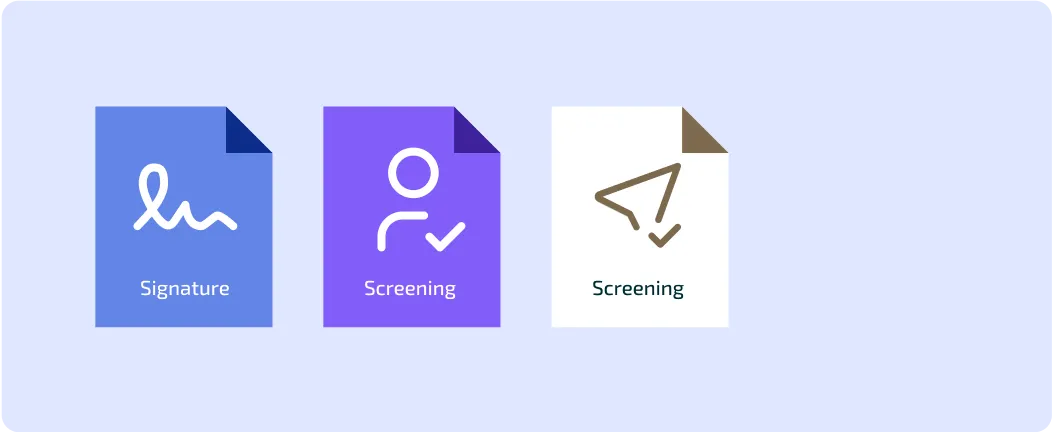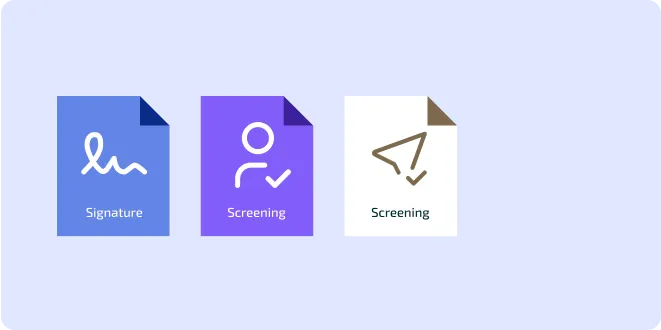.webp)
Published on
March 18, 2025
DNFBP Explained: Designated Non-Financial Businesses and Professions
In this story

Comply quickly with local/global regulations with 80% less setup time
.svg)
.svg)
Designated Non-Financial Businesses and Professions (DNFBPs) encounter distinctive vulnerabilities that necessitate establishing a strong regulatory framework.
Given their diverse activities and involvement in transactions that may expose them to risks such as money laundering and terrorist financing, a comprehensive regulatory framework becomes imperative.
Now, let's take a closer look at who these designated non-financial businesses and professionals are and what exactly they do in the world of anti-money laundering (AML).
What are Designated Non-Financial Businesses and Professions?
Designated Non-Financial Businesses and Professions (DNFBPs) are diverse entities or individuals outside the financial sector. They can be exploited for money laundering, terrorist financing, or other illicit financial activities.
According to the Financial Action Task Force (FATF), DNFBPs consist of a wide range of sectors (casinos, lawyers, notaries, and other independent legal practitioners and accountants, trust and company service providers (TCSPs), real estate agents, dealers in precious metals, and dealers in precious stones (DPMS).
List of DNFBPs
According to FATF, the following DNFBPs must adhere to AML compliance requirements:
- Casinos
- Real estate agents
- Dealers in precious metals
- Dealers in precious stones
- Lawyers, notaries, other independent legal professionals, and accountants; and
- Trust and company service providers.
Comply quickly with local/global regulations with 80% less setup time
.svg)
.svg)
The Role of DNFBPs in AML
Designated Non-Financial Businesses and Professions play a significant role in anti-money laundering, and here is how:
- Transaction Oversight: Designated Non-Financial Businesses and Professions handle substantial transactions, making them a crucial frontline in detecting and reporting suspicious activities.
- Risk Mitigation: Adhering to AML and CFT regulations, DNFBPs contribute to minimizing the risks associated with money laundering and terrorist financing. This not only safeguards their operations but also bolsters the overall financial system.
- Legal Compliance: DNFBPs uphold the integrity of the legal system by ensuring that all transactions they engage in adhere to relevant laws and regulations.
- Reputation Protection: By complying with AML and CFT rules, DNFBPs shield themselves from potential reputational damage that could arise from inadvertent involvement in illicit financial activities.
- Global Financial Stability: DNFBPs play a crucial role in maintaining the stability and security of the global financial system by reducing the risks associated with money laundering and terrorist financing.
Principal Obligations and Standards Governing DNFBPs
DNFBPs follow AML rules and regulations similar to financial institutions. However, each sector has specific rules customized to its business and industry's risk exposure. The following are the key obligations.
- Customer Due Diligence (CDD): Thoroughly check and verify customer details to understand and manage risks.
- Know Your Customer (KYC): Gather comprehensive information about clients to assess potential risks and enhance due diligence.
- Enhanced Due Diligence (EDD): Implement heightened scrutiny for high-risk clients or transactions to uncover and mitigate potential risks.
- Ongoing Monitoring: Continuously assess and supervise client transactions and activities to promptly detect and report suspicious behavior.
- Record-keeping: Maintain transaction records for at least five years to assist investigations and ensure compliance.
- Reporting Suspicious Transactions: Promptly report any detected suspicious activities to relevant authorities for further investigation.
- Internal Controls: Establish internal rules and controls to effectively manage and minimize identified risks.
- Compliance Officer: Designate a compliance officer for oversight, ensuring adherence to AML rules.
- Registration and Licensing: Obtain licenses demonstrating AML/CTF compliance to operate legally.
- International Cooperation: Cooperate with international efforts and share information to combat global illicit financial activities.
FATF Guidelines for DNFBP AML Regulation
FATF has laid out specific requirements for DNFBPs to strengthen Anti-Money Laundering (AML) and Counter Financing of Terrorism (CFT) measures.
Customer Due Diligence (CDD) and Record-Keeping
Under Recommendation 12 (Page 19), DNFBPs must conduct CDD in specific situations, such as financial transactions surpassing a defined threshold. This recommendation emphasizes maintaining proper record-keeping practices to enhance transparency.
Reporting Obligations
The requirements outlined in Recommendations 18 to 21 are applicable to all designated non-financial businesses and professions. In Recommendation 16 (Page 20) places reporting obligations on DNFBPs, including lawyers, notaries, and accountants, engaging in high-risk activities. They are required to report suspicious transactions on behalf of their clients. Additionally, dealers in precious stones must report suspicious transactions exceeding a prescribed cash threshold.
Comprehensive Regulation for Casinos
Casinos, as specified in Recommendation 24 (Page 10), are subject to comprehensive regulation. They must establish effective audit regimes, either through government authorities or self-regulatory bodies, to ensure proper AML/CFT implementation. This includes the necessity for casinos to be licensed.
What Challenges DNFBPs Encounter?
When managing financial rules and staying compliant, Designated Non-Financial Businesses and Professions encounter several challenges. Let's explore these challenges:
- Complex Schemes: Designated Non-Financial Businesses and Professions deal with tricky money laundering and terrorist financing schemes, requiring constant attention to stay ahead.
- Rules Complexity: AML (Anti-Money Laundering) and CFT (Counter Financing of Terrorism) rules are complex and change often. DNFBPs must follow these rules, which can be tough.
- Limited Resources: DNFBPs may lack the resources to implement strong AML and CFT measures, making it hard to monitor and report suspicious activities effectively.
- Global Operations: DNFBPs working across borders face challenges with different international AML and CFT standards. Matching practices with various places adds complexity.
- Technology Changes: Technology evolves fast, bringing challenges in adapting systems to detect new illegal financial activities. Continuous investment in technology is necessary. Staying ahead of the curve in adopting and adapting to emerging technologies, such as artificial intelligence and blockchain, can be both a challenge and an opportunity for DNFBPs to enhance their AML and CFT capabilities.
- Customer Checks: Checking customer details thoroughly is a challenge, especially for clients in complex transactions or those requiring confidentiality.
- New Risks: DNFBPs must stay alert to risks tied to new financial products, services, or sectors.
- Public Image: DNFBPs may find it challenging to manage public perception, as any link to illegal financial activities, even unintentional, can harm their reputation. Communicating commitment to compliance is crucial.
- Political and Regulatory Changes: DNFBPs must navigate the impact of political and regulatory changes, both domestically and internationally. Staying informed and agile in response to shifts in regulations ensures continued compliance.
- Cybersecurity Risks: With the increasing reliance on digital transactions, DNFBPs face cybersecurity challenges. Protecting sensitive financial information from cyber threats is crucial to maintaining the integrity of their operations.
- Coordination with Authorities: DNFBPs often need to coordinate closely with regulatory authorities and law enforcement agencies. Ensuring effective communication and collaboration can be challenging but is essential for a robust anti-money laundering framework.
- Training and Awareness: DNFBPs need to invest in continuous training for their staff to stay updated on the latest AML and CFT techniques. Creating a culture of awareness within the organization is vital for identifying and addressing potential risks.
- Cross-Industry Collaboration: Collaborating with other industries, especially financial institutions, can strengthen the overall defense against illicit financial activities. Sharing best practices and intelligence can enhance the collective ability to combat money laundering and terrorist financing.
How Can FOCAL Help?
An advanced AML compliance platform like FOCAL platform can significantly benefit Designated Non-Financial Businesses and Professions in several ways, and here is how:
- Transaction Monitoring: FOCAL enables you to easily and continuously monitor transactions for unusual patterns or red flags. This helps DNFBPs identify and investigate potentially suspicious activities promptly.
- Risk Assessment: FOCAL performs comprehensive risk assessments on clients and transactions. This aids DNFBPs in prioritizing their focus on higher-risk areas and ensuring efficient allocation of resources.
- Automated Due Diligence: FOCAL AML compliance platform streamlines the customer due diligence process by automating the collection and verification of customer information. This not only saves time but also enhances accuracy and consistency. Read more about the 5 Core Benefits of Automation for Compliance.
- Regulatory Compliance: FOCAL is designed to stay updated with the latest AML regulations. By automating compliance checks, DNFBPs can ensure that their operations adhere to the ever-changing regulatory landscape.
- Alerts and Reporting: FOCAL generates alerts for potentially suspicious activities and facilitates the creation of detailed reports for regulatory authorities. This aids DNFBPs in fulfilling their reporting obligations efficiently.
- Integration Capabilities: FOCAL can integrate with other systems and databases, streamlining data exchange and ensuring that DNFBPs have access to comprehensive information for more effective decision-making.
- Scalability: As DNFBPs grow or adapt to changing business landscapes, FOCAL scales to accommodate increased transaction volumes and evolving regulatory requirements.
- Data Analytics: FOCAL includes advanced data analytics tools, enabling DNFBPs to gain insights into patterns and trends associated with money laundering, thereby enhancing their proactive risk management.
- Enhanced Efficiency: By automating routine AML processes, FOCAL improves overall operational efficiency, allowing DNFBPs to focus their resources on strategic risk management and compliance efforts.
How is FOCAL Enabling Aseel?
Aseel, a pioneer in real estate crowd-investing in Saudi Arabia, faced issues in customer onboarding, risk assessment, and scalability due to manual processes causing delays and hindering growth. To tackle these challenges, Aseel turned to FOCAL, Mozn's AI-powered Risk and Compliance platform. And Here is how FOCAL transformed Aseel’s operations:
- Operational Efficiency: Aseel experienced an 87% reduction in onboarding time, with the average onboarding now taking only 40 seconds. This swift onboarding facilitated an improved customer experience and accelerated growth.
- Comprehensive Risk Assessment: FOCAL's AI-powered technologies facilitated a thorough risk assessment, enhancing Aseel's compliance practices. This transformation drove the company's growth by an astonishing 250%.
- Elimination of Manual Efforts: Manual processes were entirely eliminated, leading to fewer false alerts and human errors. Real-time insights into suspicious entities and concealed risks provided proactive threat detection capabilities.
Conclusion
In summary, an AML compliance platform serves as a valuable tool for DNFBPs, providing them with the technological infrastructure to effectively identify, manage, and report on potential risks associated with illegal financial activities. FOCAL's implementation transformed Aseel's compliance processes, unlocking operational efficiencies, reducing onboarding time, and driving significant growth.
FAQs
Q1. Is DNFBP considered high-risk?
DNFBPs can be considered high risk due to their involvement in large transactions, but risk levels vary based on specific activities and compliance measures.
Q2. What are the obligations of DNFBPs?
DNFBPs have obligations to check transactions, reduce risks through AML and CFT rules, follow relevant laws, and safeguard their reputation.
Q3. What are DNFBP examples?
DNFBP examples include real estate agents, lawyers, accountants, and other businesses not primarily engaged in financial services.
Q4. How can DNFBPs stay attentive to emerging risks associated with new financial products or services?
DNFBPs can stay vigilant by staying informed about industry trends, continuously training staff, and adapting AML and CFT measures to address new risks.
Q5. What technologies and tools can DNFBPs leverage to enhance their AML and CFT capabilities?
DNFBPs can leverage advanced tools like FOCAL AI-powered compliance platform to enhance AML and CFT capabilities.
Comply quickly with local/global regulations with 80% less setup time
.svg)
.svg)

How Aseel reduced onboarding time by more than 87% using FOCAL
Learn how FOCAL empowered Aseel to achieve new milestones.
.svg)
.svg)
Mastering Fraud Prevention: A Comprehensive Guide for KSA and MENA Businesses
51% of organizations fell victim to fraud in the last two years, don't be caught off guard, act proactively.
.svg)
.svg)
Featured blog posts





AI-Driven Precision in Fraud Risk and AML Compliance
.svg)
.svg)

.svg)
.png)




.svg)


.webp)


.webp)
.webp)


.svg)








%20(1).webp)
Comments
Leave a Reply
Comment policy: We love comments and appreciate the time that readers spend to share ideas and give feedback. However, all comments are manually moderated and those deemed to be spam or solely promotional will be deleted.